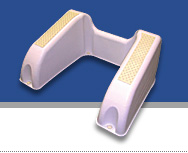|
Obesity ... Hints and Tips.
Copyright 2004, Ginacor, Inc.
Set The Right Goals
Setting the right goals is an important first step. Most people trying
to lose weight focus on just one goal: weight loss. However, the most
productive areas to focus on are the dietary and exercise changes that
will lead to that long-term weight change. Choose two or three effective
goals that are 1) specific; 2) attainable; and 3) forgiving. For example,
"Walk 30 minutes, five days each week" is specific, attainable,
and forgiving. Be kind to yourself, weigh loss doesn't happen in
a day.
Give Yourself Small Numerous Rewards
Reward yourself for your efforts. The rewards you give yourself can be
a physical thing like a CD or movie, or they can be a service or time
like an afternoon off of work, or an hour of quiet time for yourself.
Numerous small rewards, delivered for meeting smaller goals, are more
effective than bigger rewards, requiring a long, difficult effort.
Observe Yourself and Your Behavior Without Judgement
Observing your behavior oftentimes changes the behavior in the desired
direction and can produce "real-time" records for review by
you and your health care provider. For example, keeping a record of your
exercise can let you and your provider know quickly how you're doing,
and when the record shows that your exercise is increasing, you'll be
encouraged to keep it up. You might use ready made forms for this or create
your own system.
Weigh in Regularly
While you may or may not wish to weigh yourself frequently while losing
weight, regular monitoring of your weight will be essential to help you
maintain your lower weight. Remember that one day's diet and exercise
patterns won't have a measurable effect on your fat weight the next day.
Today's weight is not a true measure of how well you followed your program
yesterday, because your body's water weight will change much more from
day to day than will your fat weight, and water changes are often the
result of things that have nothing to do with your weight-management efforts.
Learn What Situations Trigger You and Avoid Them
Learn what social or environmental situations trigger you to eat. Change
that stimulus. For example, you may learn from observing that you tend
to eat more when you watch TV. Once you observe that, set a goal for yourself
that you do not eat in front of the TV. In general, visible and accessible
food items are often cues for unplanned eating.
Tips for Weight Loss:
- Eat and drink food and liquids that are warm or room temperature -
Food that is refrigerated and cold requires a lot of digestive fire
to heat it up before it is digested. This can stress and weaken the
digestive system. This seems to be the hardest recommendation for people
to follow. In this culture, we love our cold beverages especially sodas.
So, "Try it. For a one week period of time, try not to have any
cold or iced beverages and limit the amount of refrigerated fruits,
vegetables, salads, sandwiches or other cold foods." See how you
feel. Do you feel less bloated, less tired after you eat, less sluggish?
Does it seem like your energy is a little better?
- Eat when your eating - eating while you are watching TV or reading
can upset you thereby disturbing the digestive process.
- Eat easily digestible foods - foods that are cooked slightly require
less digestive energy to extract the nutrients.
- Give your digestion a rest - at least three hours before sleep stop
eating. Eating late at night can lead to poor sleep and sluggish digestion.
- Use oils and fats sparingly - fats require a lot of digestive energy
to digest.
- Eat breakfast - even if you do not feel hungry in the morning, you
should eat a little something. It will start your metabolism burning.
- Eat whole foods
This means eat whole grains, vegetables, legumes and fruits, which are
full of vitamins, minerals and protein. Sugary and processed foods are
devoid of nutrients and empty calories.
Resources:
Partnership for Healthy Weight Management
Web: www.consumer.gov/weightloss/
National Institute of Health
http://www.nhlbi.nih.gov/health/public/heart/obesity/lose_wt/behavior.htm
The FDA has not evaluated these statements. The information in this brochure
is provided for information purposes and is in no way intended to replace
the knowledge or diagnosis of your doctor. Our intention is to focus on
overall health issues or strategies. For specific guidance regarding personal
health questions, we advise consultation with a qualified health care
professional familiar with your particular circumstances. We advise seeing
a physician whenever a health problem arises requiring an expert's care.
These statements are not intended to treat, cure, diagnose or prevent
any disease. |




